キャプティブ 2020.01.30
CA2 グローバル・リンクの事業 Global Link’s Business
目次
- 1.ハワイのキャプティブの歴史
- 2.日本企業とハワイのキャプティブの歴史
- 3.ハワイキャプティブ・セミナー
- 4.「日本企業がキャプティブのドミサイルとしてハワイを選択する理由トップ10」
- 今回のまとめ
- 1. History of Hawaii’s Captives
- 2. History of Japanese Companies and Hawaii Captives
- 3. Hawaii Captive Seminar
- 4. “Top 10 Reasons for Japanese Companies to Choose Hawaii as a Captive domicile”
- Summary of this issue
Copyright © Shinichiro Hatani 2020 All rights reserved
For those who prefer to read this column in English, the Japanese text is followed by a British English translation, so please scroll down to the bottom of the Japanese text.
1994年、当時世界最大と言われた損害保険会社(米国本社)のキャプティブ部門で勤務をしていたころ、バミューダ等のカリブ海諸国を除いて米国内のキャプティブの数はVermont(バーモント州)が飛び抜けて多く300社ほど、その時ハワイ州の数はその10分の1にも満たなかった。それが現在では、ハワイ州のキャプティブの数は230社を超えるところまで来ている。
1.ハワイのキャプティブの歴史
1987年、ハワイ州のキャプティブ法や規制等は、グローバル・リンクも大変お世話になっているChar Hamilton Yoshida & Shimomotoのジェリー吉田弁護士(現Goodsill Anderson Quinn & Stifel)が、法案作成やキャプティブの申請手続手順等の作成をおこなった。下の写真は2014年10月6日、グローバル・リンクが名古屋で「企業のリスクマネジメント及びリスクマネジメント型キャプティブの研修会」を開催した際の写真である。ジェリー吉田弁護士、イトウハワイ州保険庁長官(当時)、グローバル・リンクの法務顧問、志賀 櫻弁護士が講師を務めた。
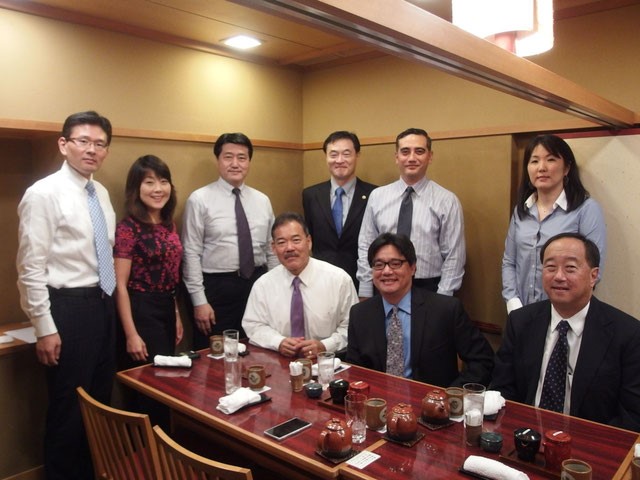
後列: 上田執行役員、島津弁護士(CHY&S法律事務所)、筆者、志賀櫻弁護士、シモモト弁護士(CHY&S法律事務所)、シマムラキャプティブ検査官(ハワイ州保険庁)
前列: ヨシダ弁護士(CHY&S法律事務所)、サイトウハワイ州保険庁副長官(キャプティブ保険局長)、イトウ保険庁長官 *事務所名、役職名は当時のものである
Back row: executive officer Ueda (GLC), attorney Shimazu (CHY&S Law Office), the author (GLC), attorney Sakura Shiga (GLC), attorney Shimomoto (CHY&S Law Office), and captive inspector Shimamura (Hawaii Department of Insurance).
Front row: Attorney Yoshida (CHY&S Law Offices), Saito (Deputy Commissioner of Hawaii Department of Insurance-Director of Captive Insurance), Itoh Commissioner of Insurance) *Office and title titles are current at the time.
2.日本企業とハワイのキャプティブの歴史
1970年、80年代、日本企業のキャプティブの多くは、カリブ海を中心とする、バミューダ、ケイマン諸島のタックス・ヘイブン・ドミサイルに設立されていたが、90年代以降、特に2000年代以降は多くの日本企業のキャプティブがハワイ州に設立されている。
過去10年間で日本企業約40社のキャプティブが全世界に設立されているが、その約50%はハワイ州に設立されている。全米では、キャプティブ数は約230社で4番目だが、保険料ベースでは、約7000億円の保険料が毎年ハワイ州にあるキャプティブに対して支払われており、全米で2番目の規模となっている。
これだけハワイに集中している理由としては、ハワイ州は米国であり、カントリーリスクが無いこと。また、キャプティブの運営をサポートする、サービスプロバイダー、保険局のキャプティブ専門部署の存在等、キャプティブに重要な基盤が整備され充実していることに加えて、日本企業にとっては、銀行、弁護士事務所、会計事務所、キャプティブマネジメント会社等のサービスプロバイダーによる、日本語でのサービスが充実していることが挙げられる。 グローバル・リンクで、過去、米国、ヨーロッパで調査をしたが、このような日本語でのサービスの提供が受けられる地はハワイ州だけであった。
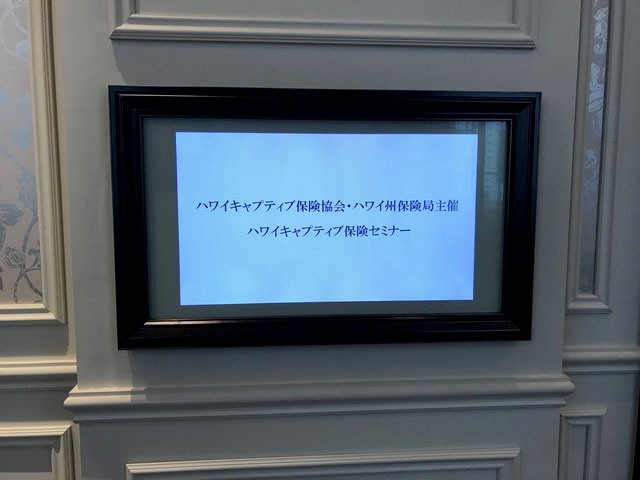
3.ハワイキャプティブ・セミナー
2017年11月14日、東京駅ステーションホテルで開催された「ハワイ州キャプティブ保険協会(HCIC)・ハワイ州保険局」共同開催のセミナーがあり、グローバル・リンクはメイン講演の講師を静岡新聞社・静岡放送とともに務めた。
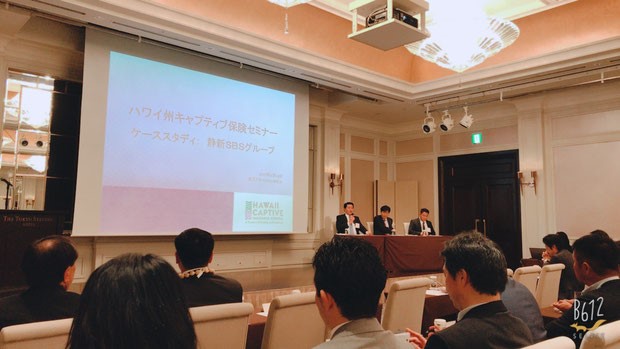
筆者、 静岡新聞社風間取締役総務局長、三澤キャプティブ・マネージャー
The author, Mr. Kazama, Director and General Affairs Bureau Chief, Shizuoka Shimbun, and Captive Manager Misawa
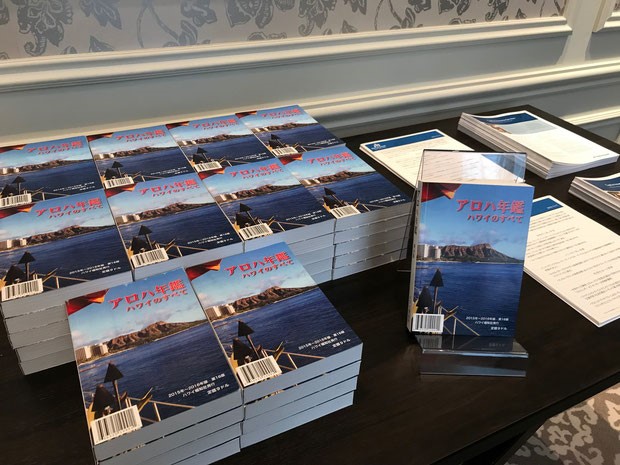
静岡新聞社のハワイ法人、ハワイ報知社発行の「アロハ年鑑」
Aloha Yearbook, published by Hawaii Hochiha, the Hawaii subsidiary of the Shizuoka Shimbun
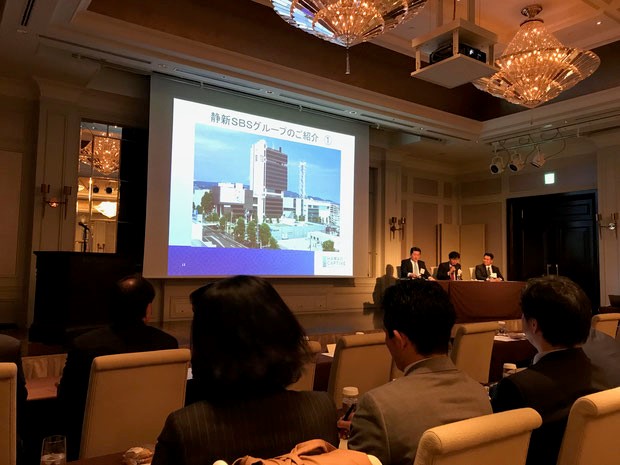
静岡新聞社の業容紹介の様子
Introduction of the Shizuoka Shimbun
4.「日本企業がキャプティブのドミサイルとしてハワイを選択する理由トップ10」
これは、上記のセミナーの共同主催者である、ハワイキャプティブ保険協会(HCIC)が発表しているものである。
① ハワイのキャプティブ保険業界には、知識と経験が豊富で日英バイリンガルの専門家達が各分野で従事している。
キャプティブの運営、管理はキャプティブ・マネージャー単独ではなく、多くのサービスプロバイダーによって成り立っている。銀行、弁護士、会計士、アクチュアリー(保険数理士)、キャプティブ・マネージャー、そしてグローバル・リンクのようなキャプティブ・コンサルティング会社である。
グローバル・リンクはハワイ州でのキャプティブの設立、運営管理をビジネスモデルとしている会社であるが、一方で「リスクマネジメントの専門企業」として、自社の経営上の不測の事態を避ける「コンティンジェンシープラン」として、ハワイ州に替わるキャプティブ設立地(ドミサイル)の選定をするため、主として「日本語でのサービスの提供が可能なサービスプロバイダーが存在するドミサイルを探す」という目的で、米国、ヨーロッパで本格的に二度調査をおこなった。結果、ハワイ州以外「日本語でのサービスはできる地域は無い」ということが判明した。世界的に見ても、ハワイ州ほど充実した現地のキャプティブ基盤があり、かつ日本語が通じるドミサイルは他に無い。ハワイ州が、注目されている大きな理由の一つである。
② ハワイ州保険局とキャプティブオーナーとの間に、協力的で迅速な対応が可能な関係が既に築かれている。
他のドミサイルの保険監督局とハワイ州の保険局を訪ねたときには、「これほど違うのか」という印象を受けた。保険局長(保険庁長官)以下、全職員から感じる、「監督機構」という側面も勿論有しているが、それよりも強く感じたのは「ビジネスパートナー」として、「より良いキャプティブ」をつくっていこうという姿勢であった。
③ 円建て資本金や運営資金の保有及び円建ての財務報告が可能であるので、日本の親会社との財務諸表の連結が容易である。
ハワイに設立する子会社であるから「海外展開用」にと「ドル建て」で資金管理をするのが一般的であるが、一定の要件を満たせば円建てでの資金管理も可能になる、非常に柔軟なキャプティブの監督体制となっている。
④ 海外の再保険及び投資市場を利用することが実現する。
世界最大の金融市場である米国での投資をおこなっているため、再保険料の送金の安全性等からキャプティブへの評価が高くなるメリットがある。
⑤ 日本・世界とビジネスを行う上でのハワイの地理的に便利な位置に加え、年間を通して安定した快適な気候であるため、出張時期が限定されない。
日本でキャプティブビジネスを推進、コントロールしていく点からは非常に効用の高い「時差」が日本とハワイにはある。日本時間の朝9時がハワイ時間の午後2時であり、日本時間の午前中はハワイの仕事時間と重なっており、「毎日の連絡がごく簡単にできる利点」がある。また、1年中温暖な気候で特に雨期もなく、また7~8時間の海外フライトとしては短い時間で出張もできる利便性は大きい。
⑥ ハワイの歴史的な日本との繋がりから日本文化に理解があり、全体的に親日感のある環境の中でビジネスを行うことができる。
現在の保険局長(保険庁長官)はMr. Colin Hayashida(ハヤシダ)であり、前保険局長は(保険庁長官)Mr. Gordon Ito(イトウ)。Family Nameから推察できるとおり、日系3世であり、銀行にも、法律事務所にも多くの日系の人たちがいるため、海外というよりも、「沖縄の少し先にある場所」という親しみの感覚を持てるところである。
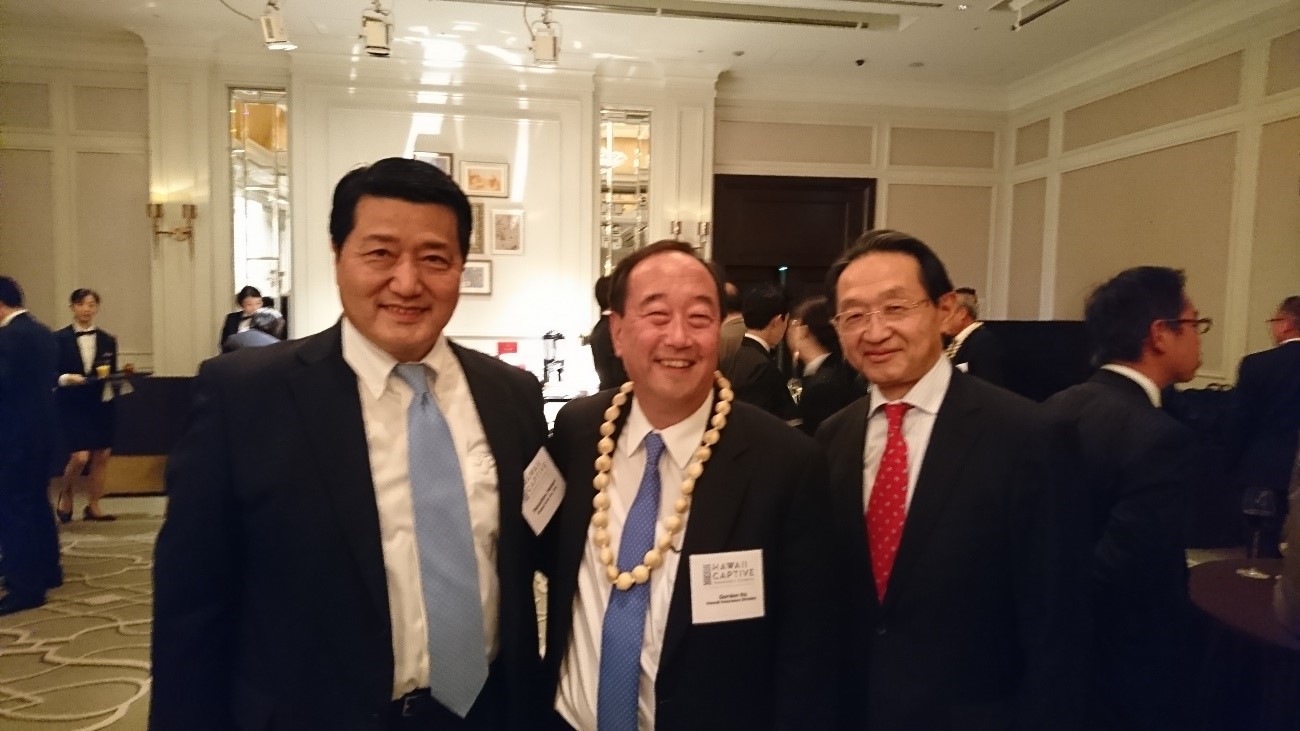
筆者 イトウ前ハワイ州保険局長(保険庁長官) 菅原執行役員
Author (GLC), Itoh- former commissioner of Insurance in Hawaii , Executive Officer Sugawara (GLC)
⑦ 法律及び規制が柔軟である。
ハワイ州で設立されるキャプティブは、米国の連邦法ではなく、ハワイ州法に基づいて申請、設立される。米国の他の州や他のドミサイルには見られない特徴であるが、ハワイ州法は保険局長にかなりの権限と裁量が与えているため、例えば、ハワイ州法に法定最低資本金が設定されているものの、最終的な最低資本金の設定は、キャプティブプログラムごとに特有な条件を考慮して、保険局長は判断して決定するというように、非常に柔軟な対応が取られているドミサイルである。
⑧ キャプティブ業界に特化した、安定的で世界的に評判の良い政府のインフラが存在する。
多くのドミサイルでは、一般の保険会社を監督する部署がキャプティブの管理監督もしているが、ハワイ州では、「キャプティブ専門の監督部署:を持って、キャプティブ特有のメリットを活かせるような管理監督がなされていることは、キャプティブにとっては大きなメリットであり、特筆すべきことであると考える。
⑨ ハワイは米国のドミサイルのため、日米租税条約のメリットを享受できる。
日米租税条約では、日本と米国との商取引に関わる租税ルールが明確に規定されており、キャプティブも日米租税条約に基づいて運営管理されるため安心である。また、保険会社に対する米国内の会計や税法のメリットも存在しており、保険会社専用の会計基準や税法が古くから導入されているため、「保険会社としてのキャプティブ」もその恩恵に浴することができることは大きなメリットである。
⑩ 内部監査の要件がない。
ハワイ州はキャプティブに対して「上場企業の監査要件として知られている、内部監査の要件を課していない」。
今回のまとめ
日本企業のキャプティブにとって、「ベストなドミサイル」を調査すればするほど、ハワイ州の優越性と効用の高さを認識することになったのが、この7年間であった。タックス・ヘイブンに所在する日本企業のキャプティブのほとんどは1970年代、80年代に設立されたものであり、当時「今のハワイ州がドミサイル候補」となっていれば、多くのキャプティブはハワイ州に設立されたのではないかと考えている。
そのことを裏打ちするように、このところ設立される超大手日本企業の保険料1000億円を超える非常に巨大なキャプティブは、いずれもハワイ州に設立されているからであり、キャプティブ・ドミサイル(設立地)としてのハワイ州の優位性を示している証拠の一つではないかと考えている。
執筆・翻訳者:羽谷 信一郎
English Translation
Captive 2 – Global Link’s Business
In 1994, when I was working in the captive division of what was then the world’s largest property and casualty insurance company (U.S. headquarters), Vermont had the largest number of captives in the U.S. (excluding Bermuda and other Caribbean countries) at about 300, with Hawaii having less than a tenth of that number. That’s now up to over 230 captives in the state of Hawaii.
1. History of Hawaii’s Captives
In 1987, attorney Jerry Yoshida of Char Hamilton Yoshida & Shimomoto (now known as Goodsill Anderson Quinn & Stifel) prepared the legislation and the procedures for captive filings, and Global Link has been instrumental in the development of Hawaii’s captive law and regulations.
The photo at the beginning of this column is from an October 6, 2014, Global Link training session in Nagoya, Japan on corporate risk management and risk management captives. Jerry Yoshida, then-Hawaii Insurance Commissioner Itoh, and Global Link’s General Counsel, attorney Sakura Shiga, served as instructors.
2. History of Japanese Companies and Hawaii Captives
In the 1970s and 1980s, most Japanese captives were established mainly in the Caribbean, Bermuda and the Cayman Islands at Tax Haven Domicile, but since the 1990s, and especially since the 2000s, many Japanese captives have been established in the state of Hawaii.
In the past decade, approximately 40 captives of Japanese companies have been established worldwide, of which approximately 50% have been established in the state of Hawaii. In the U.S., there are approximately 230 captives, making it the fourth largest captive in the U.S., but on a premium basis, approximately ¥700 billion in premiums are paid to Hawaii-based captives each year, making it the second largest in the country.
One of the reasons for this concentration in Hawaii is that the state is a U.S. state and has no country risk. In addition, there are service providers and a dedicated captive division of the Department of Insurance to support the operation of the captive, and other important infrastructure for the captive is in place and well developed. One of the reasons for this is that providers are able to provide services in Japanese. Global Link has conducted research in the U.S. and Europe in the past, and Hawaii is the only state where this type of service is available in Japanese.
3. Hawaii Captive Seminar
On November 14, 2017, there was a seminar co-sponsored by the Hawaii Captive Insurance Council (HCIC) and the Hawaii Department of Insurance at the Tokyo Station Hotel, where Global Link served as the main speaker along with the Shizuoka Newspaper and Shizuoka Broadcasting System.
4. “Top 10 Reasons for Japanese Companies to Choose Hawaii as a Captive domicile”
This was presented by the Hawaii Captive Insurance Council (HCIC), co-sponsor of the above seminar.
① The Hawaii captive insurance industry is staffed by knowledgeable, experienced, bilingual professionals in their respective fields.
Captives are operated and managed by a number of service providers, not by captive managers alone. These include banks, lawyers, accountants, actuaries, captive managers, and captive consulting firms such as Global Link.
Global Link is a company whose business model is to establish and operate and manage captives in the State of Hawaii; however, as a “specialist risk management firm,” it is also a “contingency plan” that avoids any business contingencies for its own operations, and is an alternative to the State of Hawaii as a place to establish captive, we conducted two full-scale surveys in the U.S. and Europe to select a Japanese language domicile, mainly to find a domicile with a service provider that can provide the service in Japanese. As a result, it was found that “there are no areas where Japanese language services are available” except in the state of Hawaii. No other state in the world has such a well-developed local captive base and Japanese-speaking domicile as Hawaii. This is one of the major reasons why Hawaii is attracting so much attention.
② A cooperative and responsive relationship has already been established between the Hawaii Department of Insurance and captive owners.
When I visited the other Domicile’s Office of Insurance Oversight and the State of Hawaii’s Department of Insurance, I was struck by how different they are. From the Director of the Department of Insurance (Commissioner of Insurance) on down, and from all the staff, the Department of Insurance has, of course, a “supervisory structure” aspect to it, but what I felt more strongly was its commitment to creating a “better captive” as a “business partner”.
③Since the company has capital and operating funds in yen and can report financial results in yen, it is easy to consolidate financial statements with the parent company in Japan.
Since the subsidiary is established in Hawaii, it is common for funds to be managed “in dollars” for “overseas expansion,” but the supervisory structure of the captive is very flexible, allowing it to manage funds in yen if it meets certain requirements.
④ The use of foreign reinsurance and investment markets will be achieved.
As the company invests in the U.S., the world’s largest financial market, it has the advantage of being highly regarded by captives due to the safety of reinsurance premium remittance and other factors.
⑤ Hawaii’s geographic location is convenient for doing business with Japan and the rest of the world, and Hawaii’s climate is stable and comfortable throughout the year, so there are no restrictions on the timing of business trips.
The time difference between Japan and Hawaii is very useful in terms of promoting and controlling captive business in Japan.9:00 a.m. Japan time is 2:00 p.m. Hawaii time. Japan time in the morning coincides with Hawaii’s business hours, giving us the advantage of being able to communicate easily every day. In addition, Hawaii has a warm climate all year round with no rainy season, and it is very convenient to be able to go on a business trip in a short period of time for an overseas flight of 7 to 8 hours.
⑥ Hawaii’s historical ties to Japan mean that there is a good understanding of Japanese culture and an overall friendly environment in which to conduct business.
The current Insurance Commissioner is Mr. Colin Hayashida and the former Insurance Commissioner is Mr. Gordon Ito, who is a third generation Japanese American, as you can see from his family name, and there are many Japanese Americans in the bank and at the law firm. It’s not so much a foreign country as it is a place that gives us a sense of familiarity with “a place just beyond Okinawa”.
⑦ The laws and regulations are flexible.
Captives established in the State of Hawaii are applied for and established under the laws of the State of Hawaii, not the federal laws of the United States. A feature not found in other U.S. states or other domiciles, Hawaii law gives the Director of Insurance (Insurance Commissioner) considerable authority and discretion, so, for example, although Hawaii law sets a statutory minimum capitalization, the final minimum capitalization is set by the Director of Insurance, taking into account the unique requirements of each captive program. It is a domicile that is very flexible in terms of making decisions and taking decisions.
⑧ There is a stable, globally reputable government infrastructure dedicated to the captive industry.
In many domiciles, the department that oversees general insurance companies also provides administrative oversight of captives, but in the State of Hawaii, having a “specialized captive oversight department” that allows captives to take advantage of the unique benefits of captives is a significant and noteworthy advantage for captives.
⑨ Hawaii can benefit from the benefits of the U.S.-Japan tax treaty because it is a U.S. domicile.
The U.S.-Japan tax treaty clearly sets forth the tax rules for commercial transactions between Japan and the United States, and the captive is assured that it will be operated and managed in accordance with the U.S.-Japan tax treaty. In addition, the benefits of U.S. accounting and tax laws for insurance companies also exist, and since accounting standards and tax laws dedicated to insurance companies have been in place for many years, it is a major advantage that “captives as insurance companies” can also benefit from them.
⑩ No internal audit requirements.
The State of Hawaii does not impose an internal audit requirement on captives “known as the audit requirement for publicly traded companies”.
Summary of this issue
For Japanese corporate captives, the more we researched the “best domicile”, the more we recognized the superiority and utility of the State of Hawaii in the last seven years. Most of the captives of Japanese companies located in tax havens were established in the 1970s and 1980s, and I suspect that many of them would have been established in the state of Hawaii had Hawaii been a domicile candidate at the time.
This is backed up by the fact that all of the very large captives recently established by very large Japanese companies with insurance premiums in excess of 100 billion yen have been established in the State of Hawaii, which we believe is one of the proofs of the superiority of the State of Hawaii as a captive domicile (place of establishment).
Author/translator: Shinichiro Hatani

